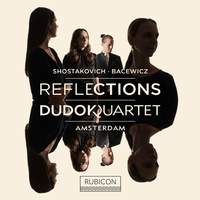Interview,
The Dudok Quartet on Shostakovich and Bacewicz
 Shostakovich's string quartets are a rich vein of self-expression, famously containing some of his most deeply personal thoughts and forming, for some people, a private counterpart to the more public expression of his symphonies. They have long been considered key "witnesses" in discussions of how far the composer did, or didn't, go with the flow of Soviet musical and political demands.
Shostakovich's string quartets are a rich vein of self-expression, famously containing some of his most deeply personal thoughts and forming, for some people, a private counterpart to the more public expression of his symphonies. They have long been considered key "witnesses" in discussions of how far the composer did, or didn't, go with the flow of Soviet musical and political demands.
Grażyna Bacewicz, like Shostakovich, trod a careful line in her music, balancing personal integrity with safety - how much to say, how to say it, and how much to stay silent. The Dudok Quartet's recent album pairs string quartets by these two composers, as well as a selection of arrangements from Shostakovich's 24 Preludes for the piano, and explores the ambiguities between the surface level and deeper hidden meanings.
I spoke to the quartet's cellist David Faber about these pieces, and some of the philosophical questions they pose.
You make the perceptive distinction between what’s really there in Shostakovich’s music, and what listeners merely paint onto it, based on what they already know of him. How much do you think it’s possible to lift a composer out of their context in this way and hear their music as a tabula rasa?
I believe it’s impossible to perceive music in a blank state. Whenever we listen to music, we simultaneously reconstruct it within our minds. This reconstruction is influenced by previous experiences, but also by randomly gathered expectancies. It is difficult to find accurate words which describe your subjective experience of music. This makes it tempting to borrow other people’s words for it, which possibly narrows down your experience. I don’t believe that people can let go of their prejudices completely. However, I do hope that people can discover ways to make their experience of music more personal and more direct by pointing out this mechanism.
Does approaching Shostakovich’s string quartet music in this intentionally “back-to-basics” way significantly change how you perform them? Would it lead to specific things like rethinking tempi or bowing decisions?
Honesty about our inability to leave prejudices at the door is an important factor during our rehearsals. We try to unveil the ambiguities which are inherent in the music, without necessarily bringing order to the chaos. This leads to out-of-the-box ways to give shape to the notes, employing the full width of our shared musical toolkit. Shostakovich could be played fast and decisively (like Beethoven), with mysterious serenity (like Gesualdo), or hard and heavy (like Metallica), and every one of these ways is equally valuable. After this, we don’t make constricting decisions about how we should perform the music, but let an interpretation emerge that is slightly distinctive at every concert, letting flow and dialogue with the audience guide us.
Do you think Vaughan Williams’s famously grouchy comment about how “a man might just want to write a piece of music” in response to people over-analysing his symphonies applies here too, and maybe even more broadly?
I prefer to keep away from vocalizing any deceased composer’s presumed intentions. Analysis of the musical material is an important part of our craft, but narrowing down a piece of music into an understandable (biographical) story has never helped anyone while shaping an interpretation. I try to gather as much information about the circumstances under which the music was first performed as I can. This information becomes part of my interpretative toolkit, but it’s not ranked higher than any novel, painting or video game I experienced, and maybe only slightly more important than the weather outside or whatever I had for diner.
In the booklet notes you suggest some widely different interpretations of what Shostakovich’s fifth quartet “means”. What do you do when members of your quartet disagree on the answers to these kinds of questions?
We broadly agree that any of these possible “meanings” has its own value and that they can coexist within the music. The decisive element to come to this agreement is time: we invest as much as it takes until every option is well considered, and let the decision-making occur spontaneously and with common sense.
Bacewicz’s quartet seems to have a more tonal, more “approachable” quality to it than the Shostakovich. Is that representative of her philosophy on music in general, or something of an exception?
Bacewicz’s style is as wide and varied as that of Shostakovich, and like him she incorporated the influences she picked up into a distinct personal vocabulary. Her 4th String Quartet forms a great introduction to her music because of its accessible language. After that there is something suitable for everyone to be found within her oeuvre: from her Piano Quintet No. 2, the darkness of which reminds me of Alban Berg’s Lulu, to her solo violin works which are fiery expansions upon Polish virtuoso traditions.
For all that there may be merit in taking a more nuanced approach to Soviet-era composers like Shostakovich and Bacewicz, do you worry that arguing against the simple framing of “oppressed genius vs totalitarianism” might be an unpopular stance?
Creating “otherness” is a rhetoric favourited by totalitarian regimes. I therefore see it as a personal responsibility to try to avoid binary narratives. I know that people are susceptible to simple framing, but I don’t find any appliance for it within my personal life or in my work as a musician. It feels much more rewarding to embrace ambiguity.
Dudok Quartet
Available Formats: CD, MP3, FLAC, Hi-Res FLAC



